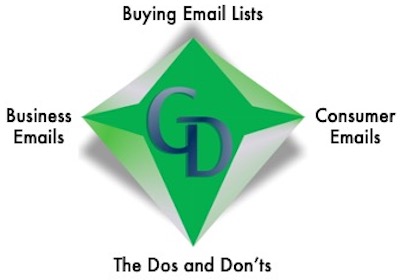A Comprehensive Guide to Purchasing Consumer Emails & Business Emails

In an era where digital marketing avenues are constantly evolving, email remains a resilient and crucial channel for businesses. The question, however, is how to rapidly populate an email list for maximum outreach. Some organizations opt to buy email lists to accelerate this process. If you're contemplating this route, it's essential to proceed with caution and comprehensive understanding.
Do Understand the Appeal of Buying Email Lists
Buying an email list is tempting because it gives you instant access to potential prospects and customers. For many marketers, this seems like a quick solution for scaling up advertising campaigns. Some people think that lists help target specific groups of people, making email marketing more efficient and effective.
However, you should not take making this decision lightly; you need to keep significant considerations and potential pitfalls in mind.
Don't Overlook the Dark Side of Purchased Email Lists
At first glance, buying an email list may seem like a straightforward path to business growth. But the downside risks are considerable.
The primary issue lies in the quality of the email list. The data could be outdated, inaccurate, or contain fake email addresses. This can negatively impact the delivery of your emails and your reputation as a sender.
Sending unsolicited emails can lead to legal and ethical issues. This can manifest as user complaints and spam reports, all which can tarnish your brand's reputation over the long term.
Do Educate Yourself on the Legality of Buying Email Lists
Understanding the legal nuances of email list buying is non-negotiable. Different places have made rules to keep people safe from unwanted emails.
For example, the US has the CAN-SPAM Act and the EU has GDPR. These regulations aim to protect individuals from receiving unsolicited emails. Penalties for non-compliance can be severe, including hefty fines and lasting reputational damage.
To mitigate such risks, it's crucial to obtain email lists from providers who adhere to data privacy laws. These providers should have obtained explicit consent from the email recipients.
Don't Settle: Find Only Reputable Email List Providers
If you determine that buying an email list is aligned with your marketing strategy, you must conduct exhaustive due diligence. Search for providers with a history of ethical data collection and adherence to privacy laws.
A reputable provider will provide you email lists of people who have chosen to receive marketing messages. This will make it more likely that they will engage with your communications. It will also reduce legal risks.
Do Embrace Segmentation and Targeting
One significant advantage of reputable email lists is the availability of segmentation options. Rather than acquiring a monolithic list, you can specify variables like age groups, geographic locations, or even consumer interests. Craft marketing messages that connect with your recipients, increasing engagement and improving your return on investment.
Do Always Opt for Opt-In Emails
Selecting an opt-in list is more than just a best practice; it's an ethical obligation. Individuals who have explicitly given permission to receive marketing materials from third parties populate this email lists. By doing this, you follow the law and increase the chance that your emails will be perceived as good, not spam.
Don't Neglect Ensuring Data Accuracy and Validation
Checking and confirming email addresses in an email list is crucial when purchasing one. However, people frequently overlook this step. Your list is only as valuable as the quality of the data within it. Therefore, before you deploy any campaigns, it's essential to apply rigorous checks to ensure the list's accuracy.
Investing in specialized email validation tools or services can make a significant difference here. These tools can go through your list of email addresses to find and delete ones that are not valid or incorrect. This makes sure you only send emails to active and real inboxes. This improves the likelihood of your emails reaching the right people and boosts your reputation as a sender.
Validation is a non-negotiable step if you're aiming for optimal deliverability rates and maximum ROI. Cutting corners on this aspect can result in not only poor campaign performance but also potential damage to your brand's credibility.
Conclusion: Do Weigh the Risks and Rewards Before Buying Email Lists.
Purchasing an email list may appear as a convenient method to expand your reach, but it involves risk and ethical concerns. To navigate this landscape responsibly, plan carefully, follow legal rules, and prioritize data quality and integrity.
The purchasing of an email list is not an end but a starting point that requires ongoing oversight and fine-tuning. The effectiveness of a marketing tool depends on both the quality of the email list and how well it is used.
